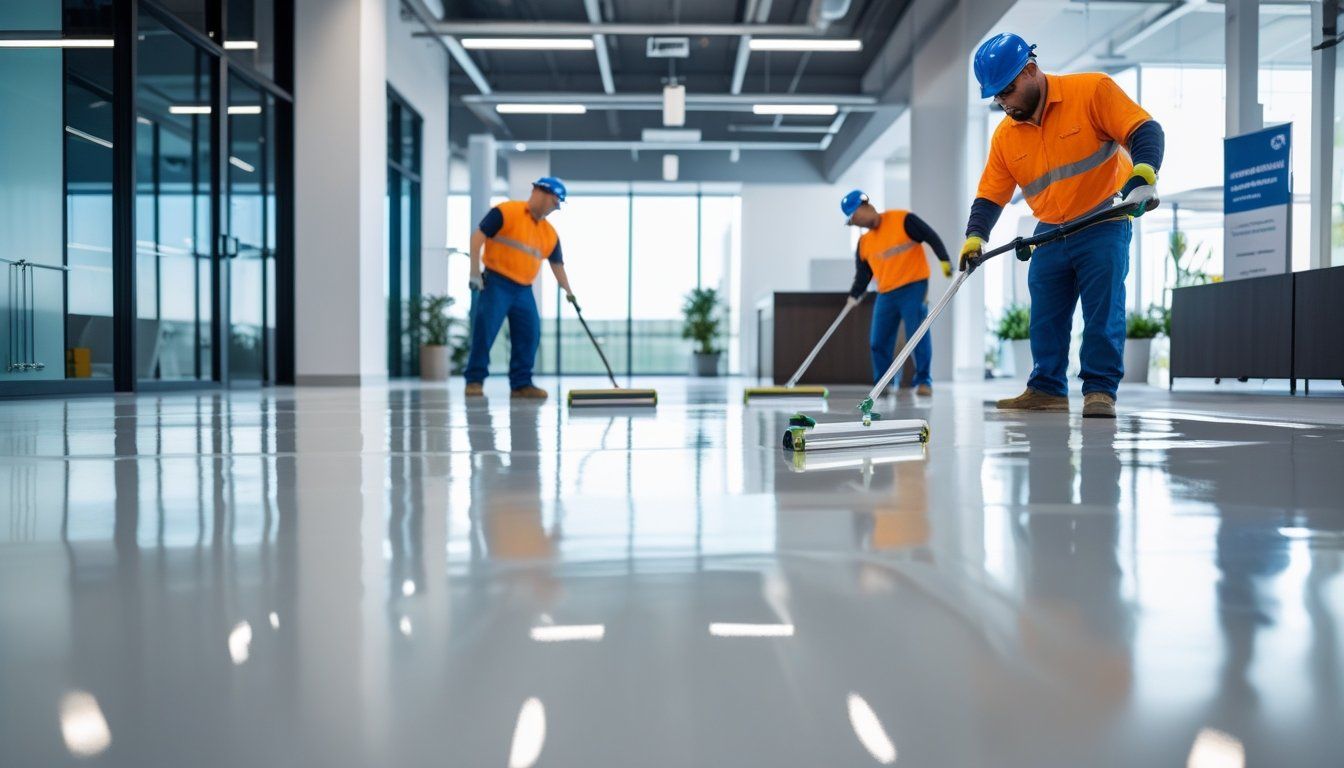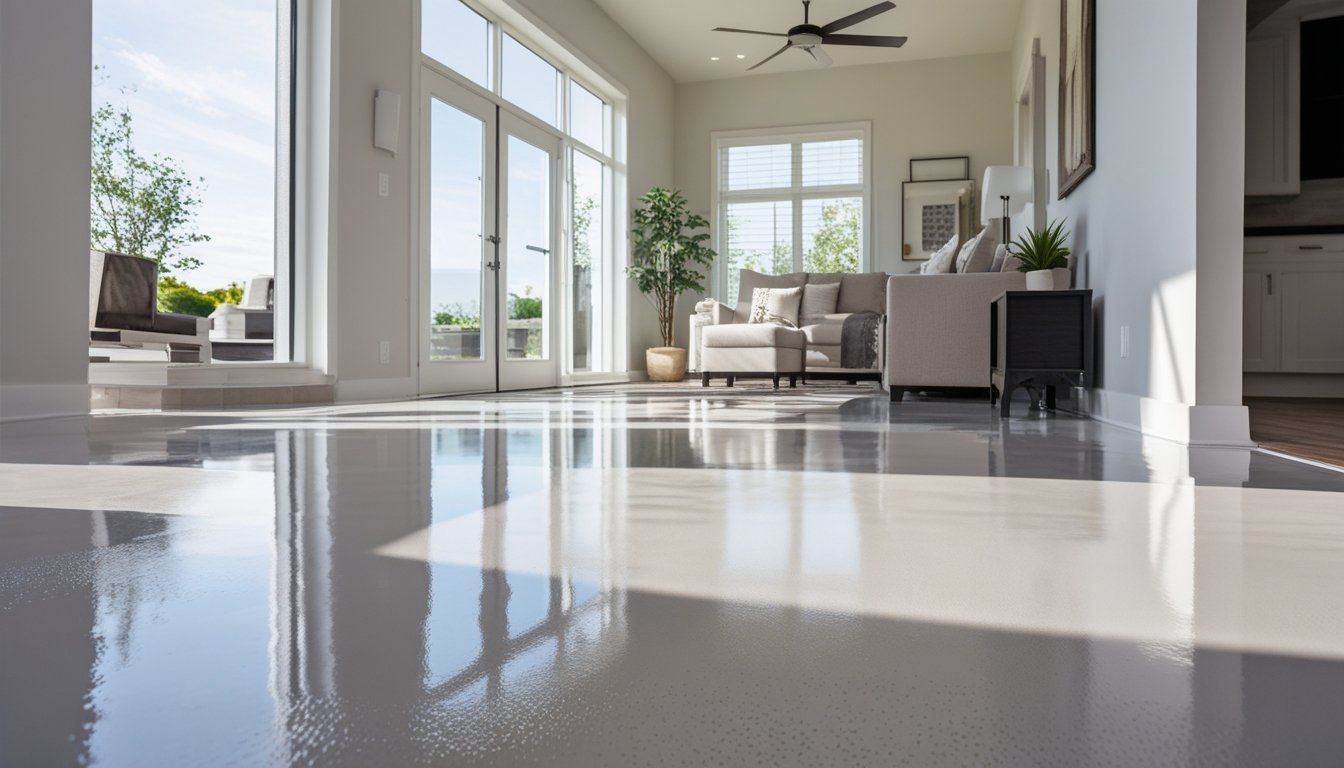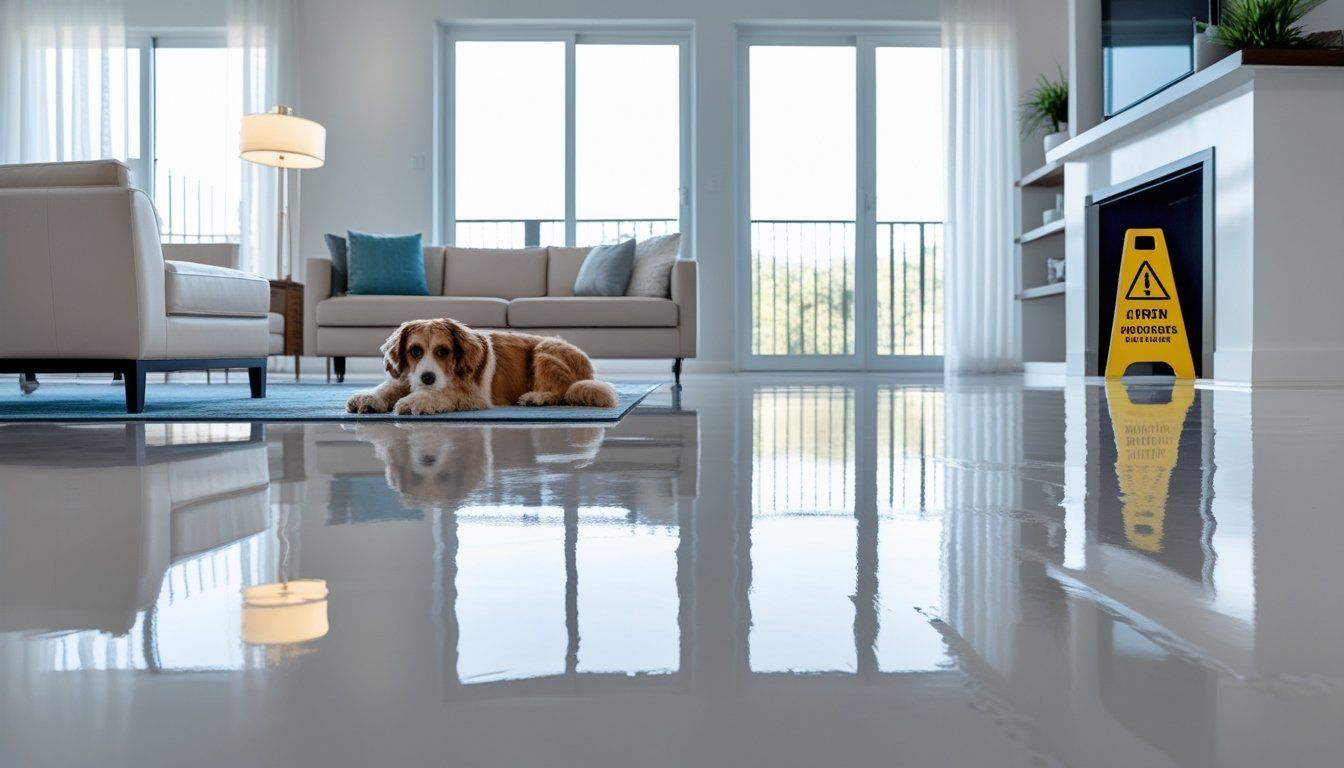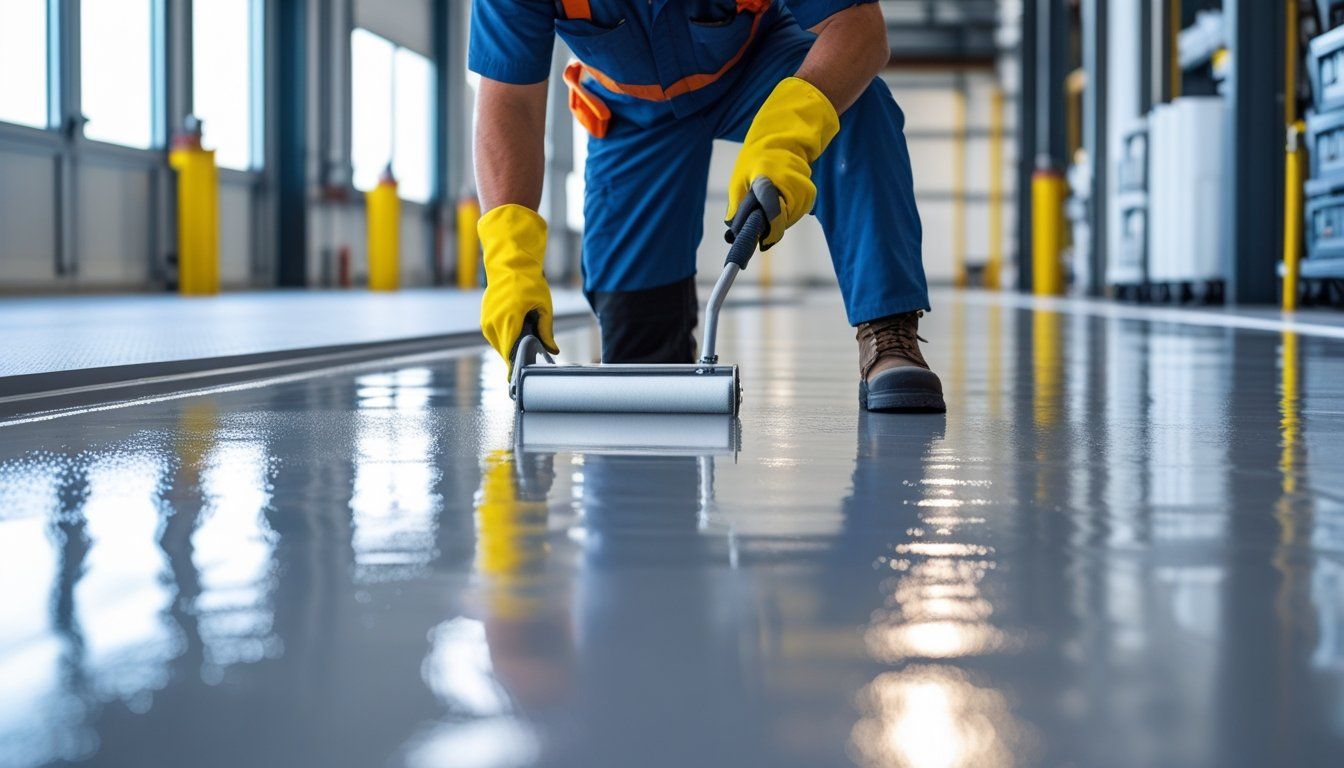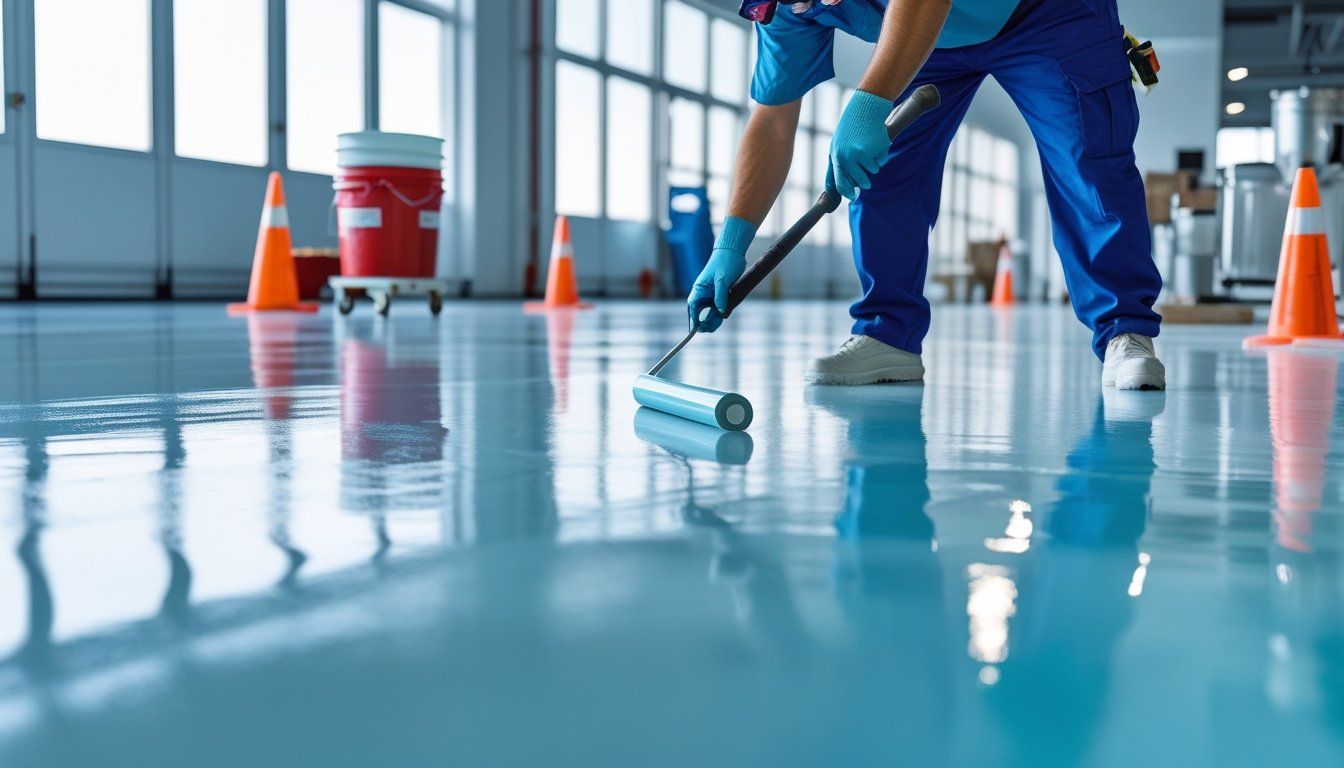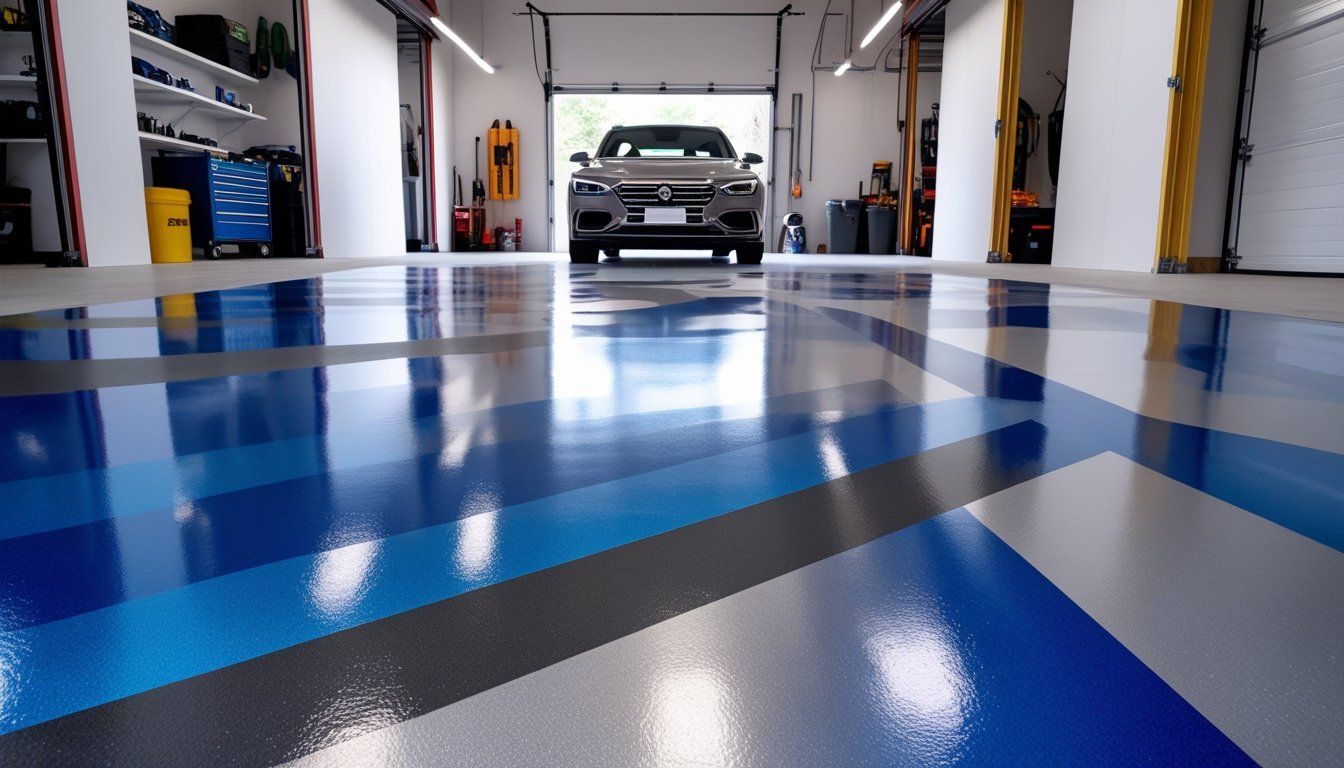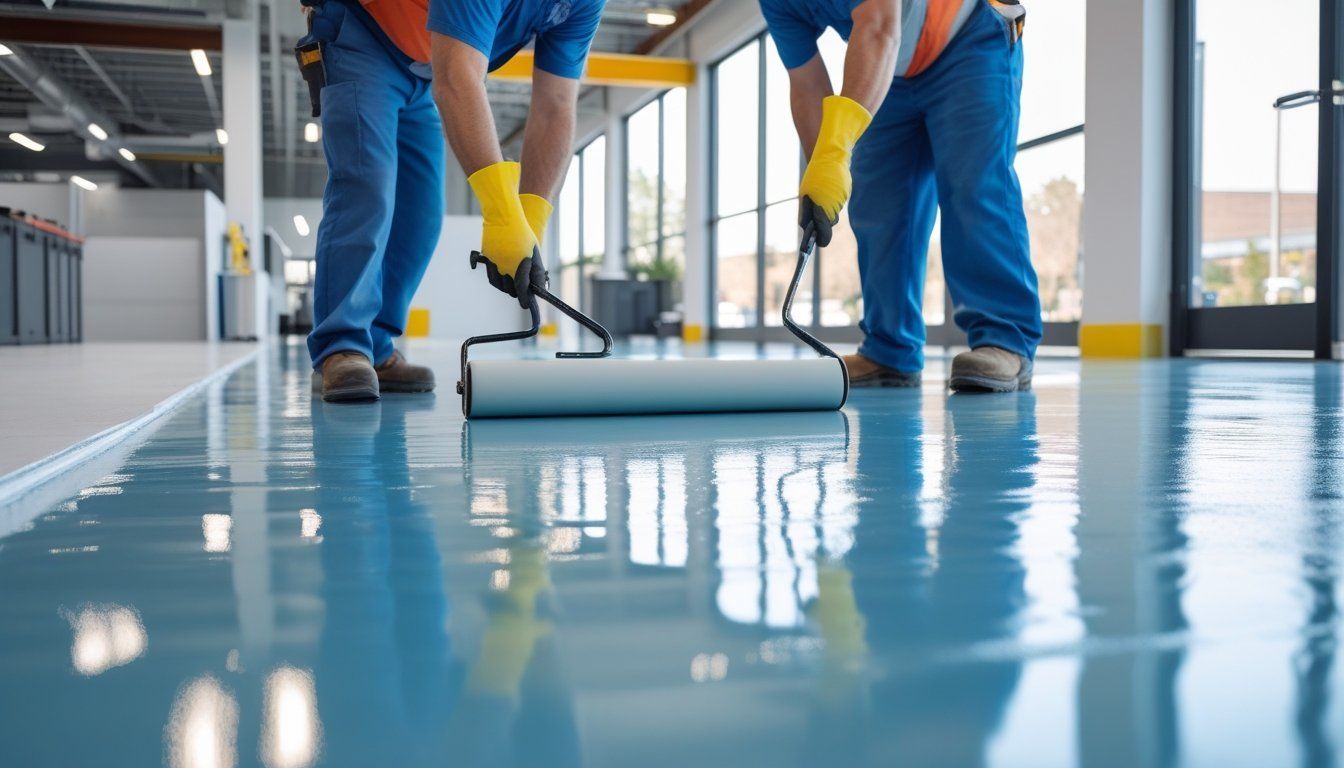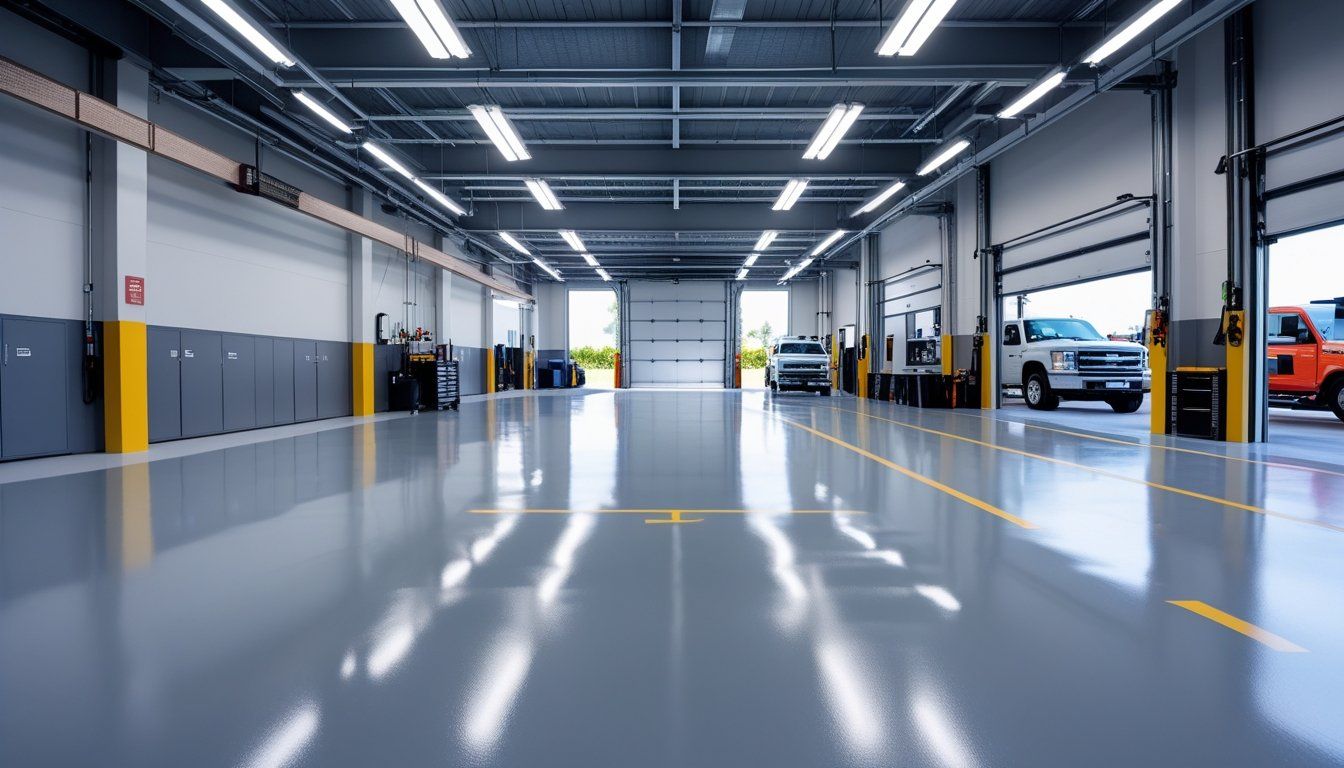Industrial Epoxy Flooring Installation in Cambridge, MA
Daniel McGonagle • October 1, 2025
Installing industrial epoxy flooring is one of the best ways to strengthen and protect your facility’s concrete surfaces. These floors stand up to heavy machinery, chemical spills, and high foot traffic while staying easy to clean.
At Cambridge MA Epoxy Flooring, we bring expert installation
services to local factories, warehouses, and production facilities.
Our team helps you choose the right epoxy system for your space—one that meets your safety standards, performance goals, and daily demands.
In this article, you’ll learn the key steps involved in industrial epoxy flooring installation, from preparation to curing. We’ll also cover the benefits, cost factors, and design options so you can make informed decisions about improving your facility’s floors.
What Is Industrial Epoxy Flooring?
Industrial epoxy flooring is a tough, protective coating applied over concrete floors. It creates a smooth, hard surface that stands up to heavy use, spills, and chemicals. This makes it a smart choice for places with lots of traffic or harsh conditions.
It combines strength and style, offering options that meet the needs of busy warehouses, factories, and other industrial spaces.
Key Features of Epoxy Flooring
Epoxy flooring is made from a mix of resin and hardeners. When combined, they form a solid, plastic-like surface that bonds tightly to your concrete floor. This surface is tough and resists damage from heavy machines, chemicals, and moisture.
Some important features:
- Durability: Lasts for years under constant use.
- Easy to Clean: A seamless finish means dirt and spills wipe away without trouble.
- Chemical Resistant: Keeps floors safe from common industrial spills.
- Customization: You can choose colors, textures, and even anti-slip finishes.
This means your floor won’t just hold up but can also look great and stay safe every day.
Comparison to Other Industrial Flooring Options
Compared to other options like polished concrete or vinyl, epoxy offers more protection and flexibility. Polished concrete can wear down faster and doesn’t handle chemicals as well. Vinyl is softer but weaker and can tear under heavy use.
Epoxy flooring gives you a harder, seamless surface that resists cracking and is easier to repair if damaged. It’s also quicker to install than some alternatives, which helps reduce downtime for your business.
While epoxy may cost a bit more upfront, its long life and simple upkeep often save you money over time.
The Role of Epoxy in Sustainable Industrial Construction
Sustainability plays a growing role in modern industrial construction, and epoxy flooring can contribute to greener facilities. According to the EPA, using low-VOC (volatile organic compound) coatings reduces harmful emissions that affect indoor air quality.
Epoxy systems with longer lifespans also help minimize waste from frequent replacements. Incorporating reflective epoxy coatings can improve lighting efficiency, reducing the need for artificial illumination.
For companies focused on energy performance and eco-certification, these environmental benefits make epoxy a valuable flooring option that supports both safety and sustainability goals.
Common Applications in Industry
You’ll find epoxy flooring in many heavy-use industrial settings.
It works well in:
- Warehouses: Handles forklifts, pallets, and heavy foot traffic.
- Factories: Resists damage from machinery and chemical spills.
- Laboratories: Offers a clean, non-porous surface that meets safety standards.
- Commercial Kitchens: Stands up to grease, heat, and constant cleaning.
If you need a floor built to last in your industrial environment, epoxy is a reliable choice.
Benefits of Industrial Epoxy Flooring
Industrial epoxy flooring offers strong protection and long-term value. It stands up well to heavy use, harsh chemicals, and slippery conditions. This makes it a practical choice for busy industrial spaces around Cambridge and Greater Boston.
Durability and Longevity
Epoxy flooring is highly durable, designed to handle heavy machinery and constant foot and vehicle traffic without cracking or chipping. It bonds tightly to concrete, creating a seamless surface that stays intact over time.
Because of its toughness, epoxy flooring reduces the need for repairs or replacements. This means less downtime for your facility and lower maintenance costs. We install epoxy floors that resist impact and wear, ensuring that your industrial space stays protected for years.
Chemical and Stain Resistance
Your industrial floors face spills of oils, acids, and other harsh chemicals. Epoxy coatings provide strong resistance to these substances, preventing stains and damage. This resistance keeps your floors looking clean and professional, even after heavy exposure to chemicals.
It also protects the concrete underneath from corroding or weakening. Easy cleanup is another benefit. You can quickly wipe spills away without worrying about permanent marks or breakdown of the floor’s surface.
Safety and Slip Resistance
Safety is key in industrial settings. Epoxy flooring can be customized with anti-slip textures to reduce the risk of slips and falls, even when the floor is wet or oily. These coatings also improve visibility with bright colors or markings to guide workers and vehicles.
This supports workplace safety and compliance. By choosing epoxy floors through a local installer, you also get coatings that meet the safety standards required for industrial environments in the Boston area.
Preparing for Epoxy Flooring Installation
Getting ready for epoxy flooring means focusing on the condition of your floor, having the right tools and materials, and cleaning your space thoroughly. These steps help ensure your new floor sticks well, looks great, and lasts a long time.
Surface Assessment
Before anything, check your concrete floor for cracks, stains, or moisture issues. Epoxy needs a clean, dry surface to bond properly. If there’s any oil, grease, or damage, it must be repaired or removed. Test for moisture with a simple plastic sheet test or a moisture meter.
If the moisture is high, the epoxy may peel or bubble later. You might need a moisture barrier or special primers to fix this. Uneven floors might need grinding or sanding. A trusted company uses professional tools to make sure your floor is perfectly smooth and ready for epoxy.
Necessary Equipment and Materials
You will need:
- Concrete grinder or shot blaster for surface prep
- Degreasers and cleaners to remove dirt and oil
- Epoxy resin and hardener (mixed in exact ratios)
- Protective gear like gloves, masks, and goggles
- Roller or squeegee for smooth epoxy application
- Optional: decorative flakes, anti-slip additives, and topcoats
Having all tools ready helps the installation go smoothly without delays. Your local installers in Cambridge will bring professional-grade materials suited to your space's needs.
Pre-Installation Cleaning Steps
Begin by sweeping and vacuuming the floor to remove dust and loose debris. Then use a heavy-duty degreaser to clear away any oil or grease spots. Even a small amount of residue can weaken epoxy adhesion. Rinse the floor well with water and let it dry completely.
Moisture here can trap bubbles under the epoxy. If necessary, use fans or heaters to speed dry times. Once clean and dry, do a final wipe with a tack cloth or microfiber mop to catch any leftover dust.
This keeps the surface perfectly ready for coating and prevents imperfections. Taking these cleaning steps seriously protects your investment and helps make your new epoxy floor a strong, beautiful surface.
Step-by-Step Industrial Epoxy Flooring Installation Process
Installing industrial epoxy flooring takes care and exact steps. Your floor needs to be repaired, cleaned, and prepped first. Then, you mix and apply the epoxy carefully. After that, the floor must cure properly before the last touches are done.
Checking the work at each stage helps make sure the floor will last and look good.
Surface Repair and Priming
The first step is fixing any cracks, holes, or damage in your concrete floor. These flaws can weaken the epoxy and cause it to fail early. You might need to fill cracks with epoxy or cement-based fillers.
After repairs, the floor must be cleaned thoroughly to remove dust, grease, and old coatings. Once the surface is smooth and clean, a primer is applied. The primer helps the epoxy stick better and last longer. Make sure the primer is fully dry before moving on.
Proper surface repair and priming give you a strong base for the epoxy coating, which is key for durability.
Mixing and Application Techniques
Mixing the epoxy parts exactly as the instructions say is very important. The two main parts must blend well for the coating to cure and harden properly. Use a drill mixer or a similar tool to combine the resin and hardener evenly.
Apply the epoxy with rollers or squeegees, starting at the farthest corner and working your way out. Spread the epoxy in thin, even layers to avoid bubbles or streaks. Some floors may need multiple coats depending on wear levels. Work carefully and quickly, as epoxy starts to set fast.
Curing and Finishing Processes
After applying, the epoxy floor needs time to cure. This means it hardens and gains strength. Curing usually takes 24-72 hours, but the exact time depends on temperature and humidity. During this period, keep the area well-ventilated and avoid walking on the floor.
Once cured, a clear topcoat can be added for extra protection and shine. This also improves chemical and UV resistance. The finishing step locks in the epoxy’s durability and gives your floor a polished look that’s easy to clean and maintain.
Quality Control Checks
You want your floor to perform well for many years. That means checking for bubbles, uneven spots, or missed areas after each step. Use bright lighting and inspect closely for surface issues. Any defects should be fixed before the next layer or before finishing.
Tests like measuring floor adhesion and thickness can confirm the job meets standards. If you’re working with local experts, they follow strict quality controls to ensure your floor can handle heavy equipment, spills, and constant traffic in Greater Boston’s industrial spaces.
Choosing the Right Type of Epoxy Flooring
Picking the right epoxy floor depends on your space’s needs, traffic, and type of use. Some floors focus on smoothness and shine, others on toughness, and some prevent static buildup. Choosing the proper type keeps your floors lasting longer and working better.
Self-Leveling Epoxy Floors
Self-leveling epoxy creates a smooth, shiny surface
that works best on clean, new, or flat concrete. It spreads evenly, covering small cracks and imperfections.
This kind of floor is easy to clean and perfect for warehouses, showrooms, or places where appearance and hygiene matter. If you want a seamless design that resists stains and chemicals, self-leveling epoxy suits your needs.
The glossy finish also helps brighten darker spaces by reflecting light. It’s a solid choice for moderate foot or equipment traffic, especially in industrial areas around Cambridge and Greater Boston.
Mortar Epoxy Flooring
Mortar epoxy is thicker and tougher than self-leveling types. It’s made by mixing epoxy with sand or other aggregates, creating a very hard surface. This floor holds up well where heavy machinery moves or where impacts and abrasion are common.
If your facility handles forklifts, pallets, or heavy equipment, mortar epoxy can take that kind of force without cracking. It’s also more resistant to chipping and wear. This type is common in factories and warehouses where durability is the top priority.
Installation requires a rougher base, so existing damage may be repaired as part of the process.
Anti-Static Epoxy Coatings
Anti-static epoxy floors reduce static electricity buildup, which is critical in places with sensitive electronics or flammable materials. These coatings contain special materials that safely discharge static to avoid shocks or sparks.
If your work involves laboratories, electronic assembly, or chemical storage, anti-static epoxy protects your staff and equipment. It combines safety with the usual benefits of epoxy, like chemical resistance and durability.
You get a low-maintenance floor suited for technical and high-risk spaces in Cambridge area industrial settings. For expert installation and advice on the right epoxy for your project, our team offers local support tailored to your needs.
Common Challenges in Epoxy Installation
Installing industrial epoxy flooring takes careful attention to detail. Certain factors like weather, the condition of your floor, and small surface flaws can affect how well the epoxy bonds and performs over time.
Humidity and Temperature Concerns
Epoxy needs the right temperature and humidity to cure properly. If it’s too cold, the epoxy may not harden well, causing it to stay sticky or bubble. High humidity can cause moisture to get trapped under the epoxy, leading to bubbling or peeling later.
It’s best to install epoxy when temperatures are between 60°F and 85°F, with low humidity levels. Your local climate in Cambridge and the surrounding areas can impact this.
Substrate Compatibility Issues
The condition of the floor below the epoxy—called the substrate—is key. Concrete floors with cracks, moisture problems, or dirt won’t bond well with epoxy. Before installation, the floor must be cleaned, dried, and repaired. If there’s oil or grease, it needs to be removed completely.
Moisture coming up through the concrete is a common problem in warehouses and factories. Testing for moisture before you apply epoxy can save you from failures and costly repairs.
Dealing With Imperfections
Uneven surfaces and cracks are common in industrial floors. If the epoxy is applied over these flaws without fixing them, the finish will look rough and might peel. You need to fill cracks and level the surface before coating.
This step also helps the epoxy layer to distribute evenly, preventing thin spots or weak areas. Professional installers use grinders or shot blasters to prepare your floor for the best smooth finish. Proper prep work ensures your floor is safe, durable, and looks great.
Maintenance and Care for Industrial Epoxy Floors
Keeping your industrial epoxy floors in top shape takes regular cleaning, quick repairs, and smart steps to make them last longer. Proper care helps your floors stay durable, safe, and looking good despite heavy traffic and tough conditions.
Routine Cleaning Advice
You should clean your epoxy floors often to prevent dirt buildup and stains. Use a soft broom or a dust mop daily to remove loose debris. For deeper cleaning, use a gentle cleaner mixed with water. Avoid harsh chemicals or acidic cleaners, as these can damage the epoxy coating.
When using a mop or floor scrubber, choose ones with soft pads to protect the surface. Rinse floors with clean water after washing to remove residue. Cleaning frequency depends on foot and machine traffic. A good rule is to clean lightly every day and deep clean once a week.
Repairing Damaged Areas
Small chips, cracks, or scratches can happen over time. Fixing these quickly stops damage from spreading and keeps your floors safer. For minor damage, use an epoxy repair kit that matches your floor’s finish.
Clean the damaged area before applying the patch and follow the product instructions carefully. If damage is extensive, contact a local installer. They can assess the problem and offer professional repairs that restore your floor’s strength and appearance.
Extending Floor Lifespan
To make your epoxy floors last as long as possible, avoid dragging heavy objects across them without protection. Use floor mats or pads under machinery and tools to reduce wear.
Control spills quickly, especially oil, chemicals, or acids, by wiping them up right away. Scheduling regular inspections helps catch problems early.
Cost Factors for Epoxy Flooring Installation
Knowing what affects the price of epoxy flooring can help you plan your budget better. The main factors include the price of materials and labor, the size and design of your floor, and how much value the floor adds over time.
Each one plays a role in the overall cost and benefits of your new flooring.
Material and Labor Costs
The price of materials can vary depending on the epoxy type you choose. Basic epoxy coatings usually cost less, while specialty blends with color flakes or metallic finishes can cost more.
Labor costs depend on how much preparation the floor needs. If your concrete has cracks or stains, fixing these before applying epoxy adds time and money.
Professional installers handle these steps to ensure lasting results. Typical costs range from $4 to $12 per square foot, including materials and labor. Surface prep, curing time, and any specialized finishes can affect the final price. Getting a clear quote helps avoid surprise costs.
Floor Size and Design Considerations
The size of your floor directly impacts cost. Larger floors require more epoxy and longer installation time. Small spaces like home garages will cost less overall but might have a higher price per square foot due to setup fees. Design choices also matter.
If you want decorative effects such as patterns, color blends, or anti-slip textures, the cost goes up. Complex designs take more time to apply and may require extra materials. Planning your layout and design carefully can save money.
Long-Term Value Assessment
Although epoxy flooring can be a significant upfront investment, it pays off with durability and low maintenance. Epoxy floors resist stains, spills, and heavy traffic, reducing repair and replacement costs.
You can expect your epoxy floor to last 10 to 20 years with proper care. This makes it a smart choice for warehouses, factories, or busy commercial spaces.
Epoxy’s easy-to-clean surface also saves time on upkeep and helps keep your space safe. We specialize in providing floors that deliver strong, long-term savings for your industrial or commercial site.
Industrial Epoxy Flooring Safety Considerations
When installing industrial epoxy flooring, safety must be a top priority to protect everyone on site. This means following clear safety steps, using the right gear, and meeting important industrial rules.
Doing these things helps prevent accidents and keeps your space safe both during and after installation.
On-Site Safety Protocols
Controlling the workspace is crucial during the epoxy floor installation. Good ventilation is needed to reduce fumes from the epoxy chemicals. You should keep areas well-airflowed to avoid breathing trouble.
Make sure the work area
is clean and clear of unnecessary tools and obstacles. Wet or freshly coated floors can be slippery, so mark these zones with warning signs or barriers. This prevents falls and keeps non-workers safe.
Training is important. Everyone involved needs clear instructions about handling materials and emergency steps. Quick cleanup supplies and fire extinguisher access should be on hand at all times.
Protective Equipment During Installation
Protective gear helps guard against health risks while installing epoxy floors. You should wear:
- Respirators or masks to filter chemical fumes
- Gloves to protect skin from irritation
- Safety goggles to shield eyes from splashes
- Long-sleeve clothing and boots to minimize skin contact
Proper equipment reduces the chance of chemical burns, allergic reactions, or lung issues.
Compliance With Industrial Standards
Industrial epoxy flooring must meet strict safety standards. These include rules about chemical handling, slip resistance, and fire safety. Following OSHA guidelines helps your floors stay safe and legal.
Color-coded zones or anti-slip additives in the epoxy improve workplace safety by reducing trip and fall risks. Your floor can mark walkways or hazard areas clearly. Choosing a company that knows local regulations means your floor will meet safety codes to protect your workers and your business operations.
Trends and Innovations in Industrial Epoxy Flooring
Industrial epoxy flooring keeps improving to meet your needs for durability, safety, and style. New materials and techniques focus on being eco-friendly, faster to install, and highly customizable. These advances help you get floors that last longer and fit your specific space perfectly.
Sustainable Epoxy Flooring Solutions
You can now choose epoxy flooring made from sustainable materials. These options reduce harm to the environment without losing strength or durability.
Using low-VOC (volatile organic compounds) coatings means your space stays safer and cleaner during installation. Sustainability also includes recycling old flooring materials into new epoxy mixes.
This lowers waste in construction projects. Durable epoxy floors can extend the life of your concrete slab by protecting it from cracks, spills, and heavy wear.
New Epoxy Formulation Technologies
Recent advances have led to faster-curing epoxy formulas. These reduce downtime for your facility because the floors harden quickly after application. Many of these formulas also improve resistance to chemicals, abrasion, and temperature changes.
This is essential for tough industrial settings. Innovations include enhanced slip-resistant finishes that increase safety without sacrificing floor brightness or color. You can rely on these advanced coatings to handle heavy foot and vehicle traffic while maintaining easy cleaning and maintenance.
Custom Design Options
You can now tailor your epoxy floor’s look and texture with more choices than ever. Customization includes metallic finishes, colored flakes, and 3D designs that make your floor unique and attractive.
Beyond visuals, you can add specific surface textures for anti-slip properties or zoned areas to separate workspaces. These design options help your floor fit your brand’s style or safety requirements.
Whether you want a sleek, modern appearance or bright, clear markings, careful design can improve workspace organization and employee safety. Our team can help you explore these options to match your industrial site’s look and function.
Get Professional Industrial Epoxy Flooring in Cambridge, MA
Industrial epoxy flooring offers the strength, safety, and durability your facility needs to stay efficient and professional. With seamless protection against chemicals, impacts, and heavy machinery, it’s a flooring system built for demanding environments.
At Cambridge MA Epoxy Flooring, we specialize in expert industrial epoxy flooring installation tailored to your site’s specific requirements.
From surface prep to final coating, our team ensures your floors are durable, compliant, and visually polished.
Upgrade your facility with industrial-grade epoxy floors that work as hard as you do. Contact us today
to schedule a free consultation and get a detailed quote for your installation.
Frequently Asked Questions
Understanding the cost, installation details, and product choices will help you plan your industrial epoxy flooring project. It’s also important to know the right preparation and application steps to get the best result.
How can I accurately estimate the cost of installing industrial epoxy flooring?
Costs depend on the size of your space, the type of epoxy used, and the condition of the existing floor. Smaller jobs under 4,000 square feet usually take about three to four days to complete. Contacting local experts like Cambridge MA Epoxy Flooring can give you a tailored estimate based on your needs.
Where can I find a step-by-step installation video guide for industrial epoxy flooring?
You can find detailed video guides that walk you through each stage, from surface prep to finishing. These resources show the process clearly and can be helpful if you want to understand what happens during the installation.
Could you recommend the best industrial-grade epoxy for flooring purposes?
The best epoxy for industrial floors is one that offers high durability, chemical resistance, and slip protection. Look for products designed for heavy traffic and tough conditions. Your local provider, like Cambridge MA Epoxy Flooring, can suggest options that fit your environment and safety needs.
What should I be aware of before deciding to install epoxy flooring in an industrial setting?
Proper surface prep is crucial. Your floor must be clean, dry, and free of cracks or oils. Also, consider how much downtime your operation can tolerate, since curing takes time. Choose epoxy that matches the workload and chemicals your floor will face.
Can you provide tips on how to apply epoxy flooring over concrete surfaces?
Start by cleaning the concrete thoroughly and repairing any damage. Next, apply a primer to help the epoxy stick well. Pour the epoxy evenly and use tools like rollers or squeegees to spread it. Make sure the temperature and humidity fit the epoxy’s guidelines for best results.
Are there any DIY tips for installing industrial epoxy flooring that can save on costs?
You can save money by doing some prep work yourself, like cleaning and minor repairs. Renting equipment like grinders or rollers may help too.
